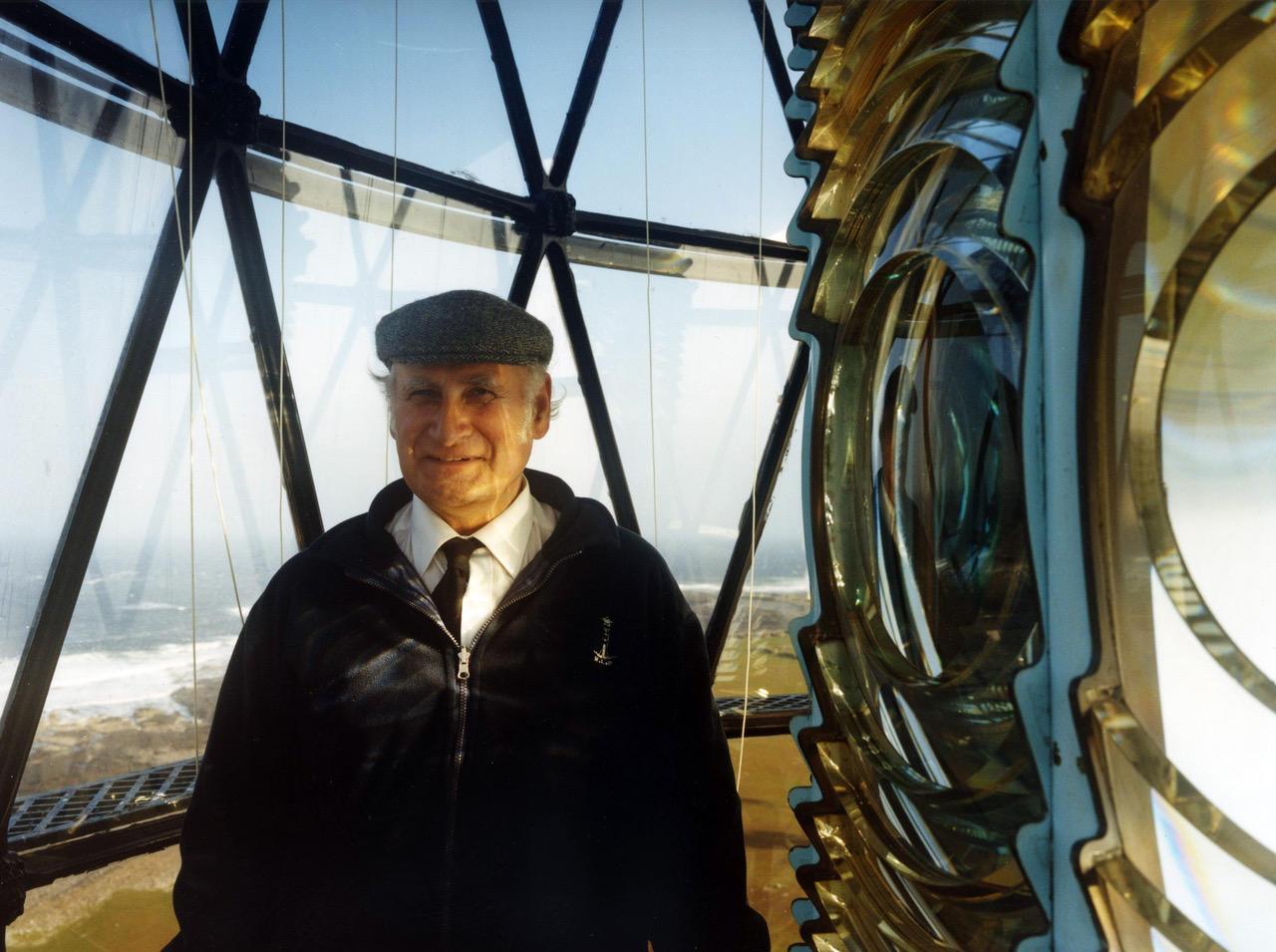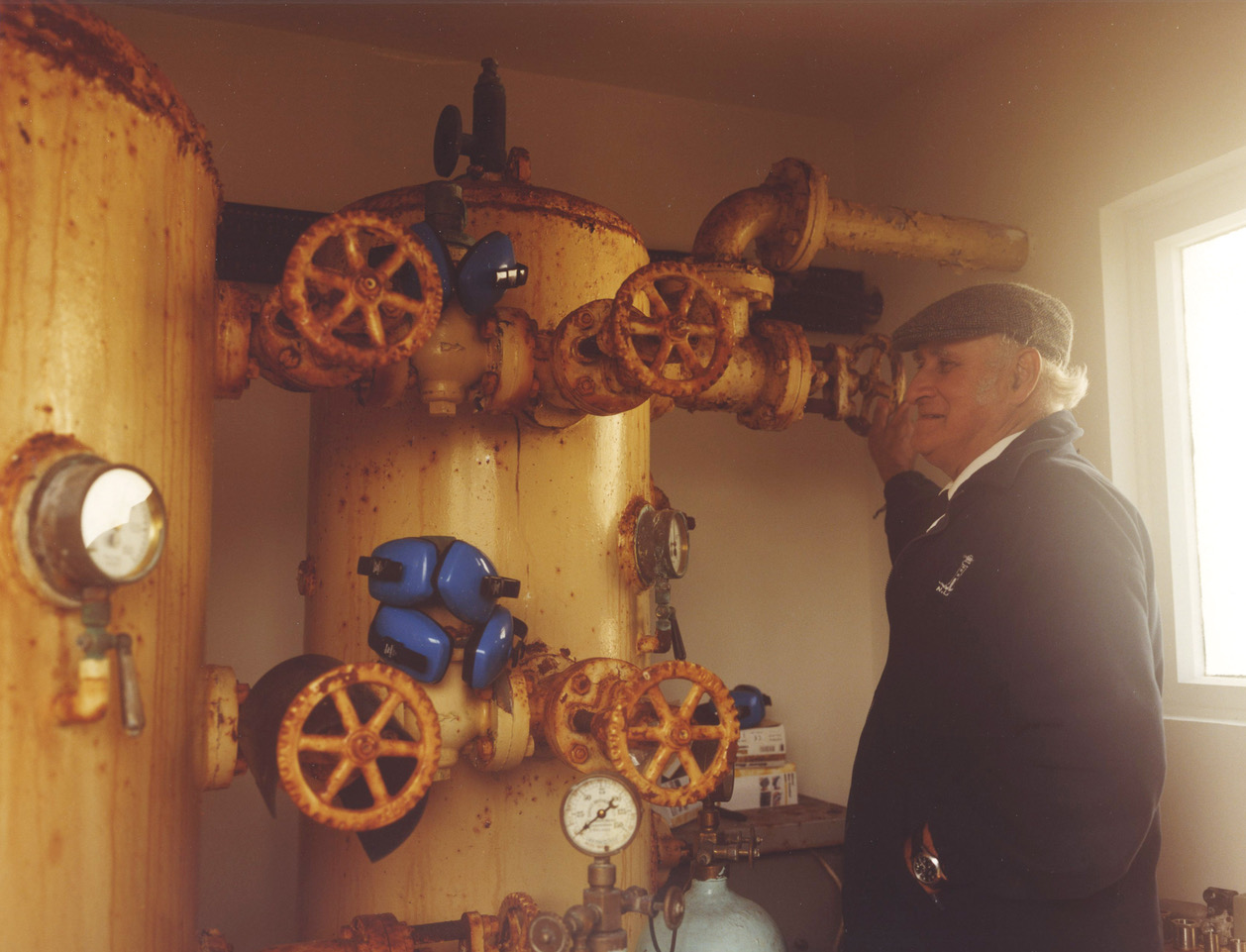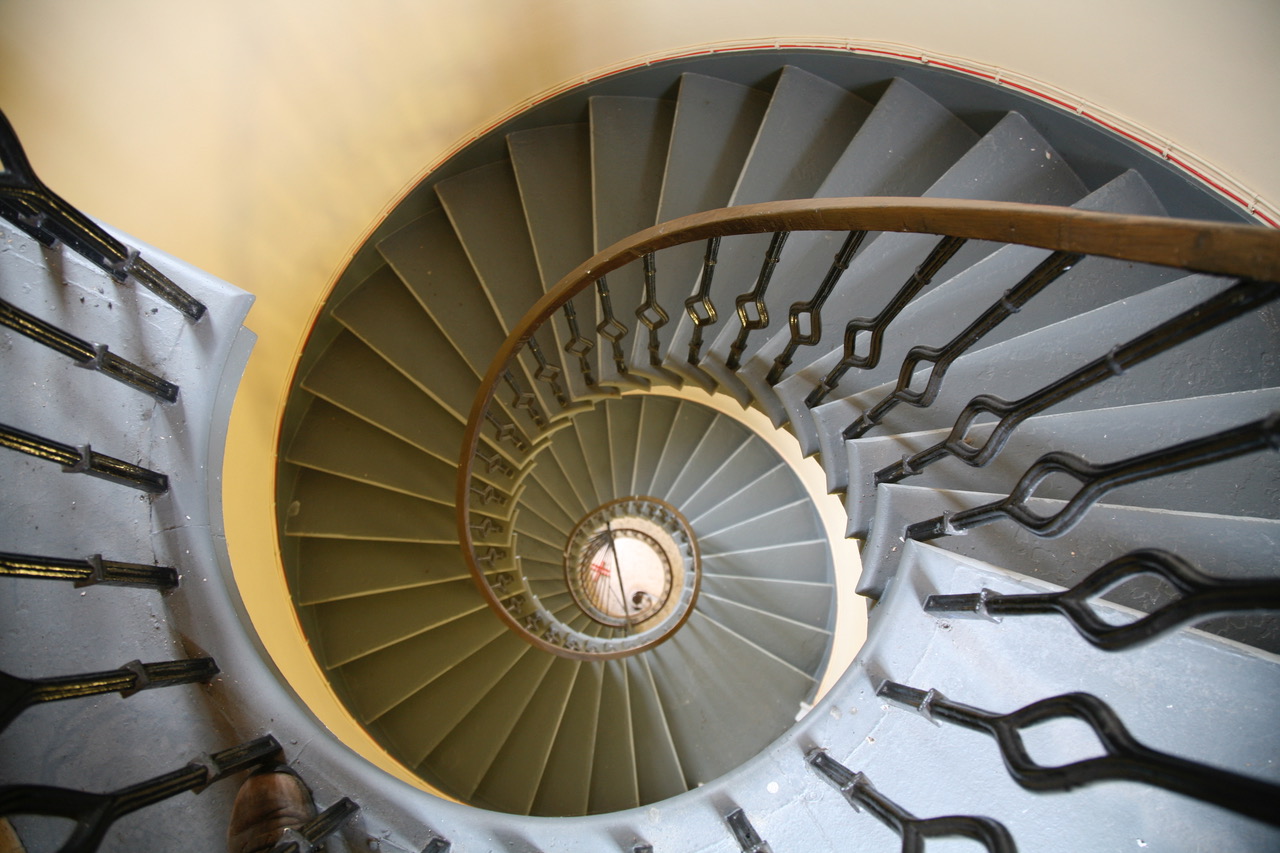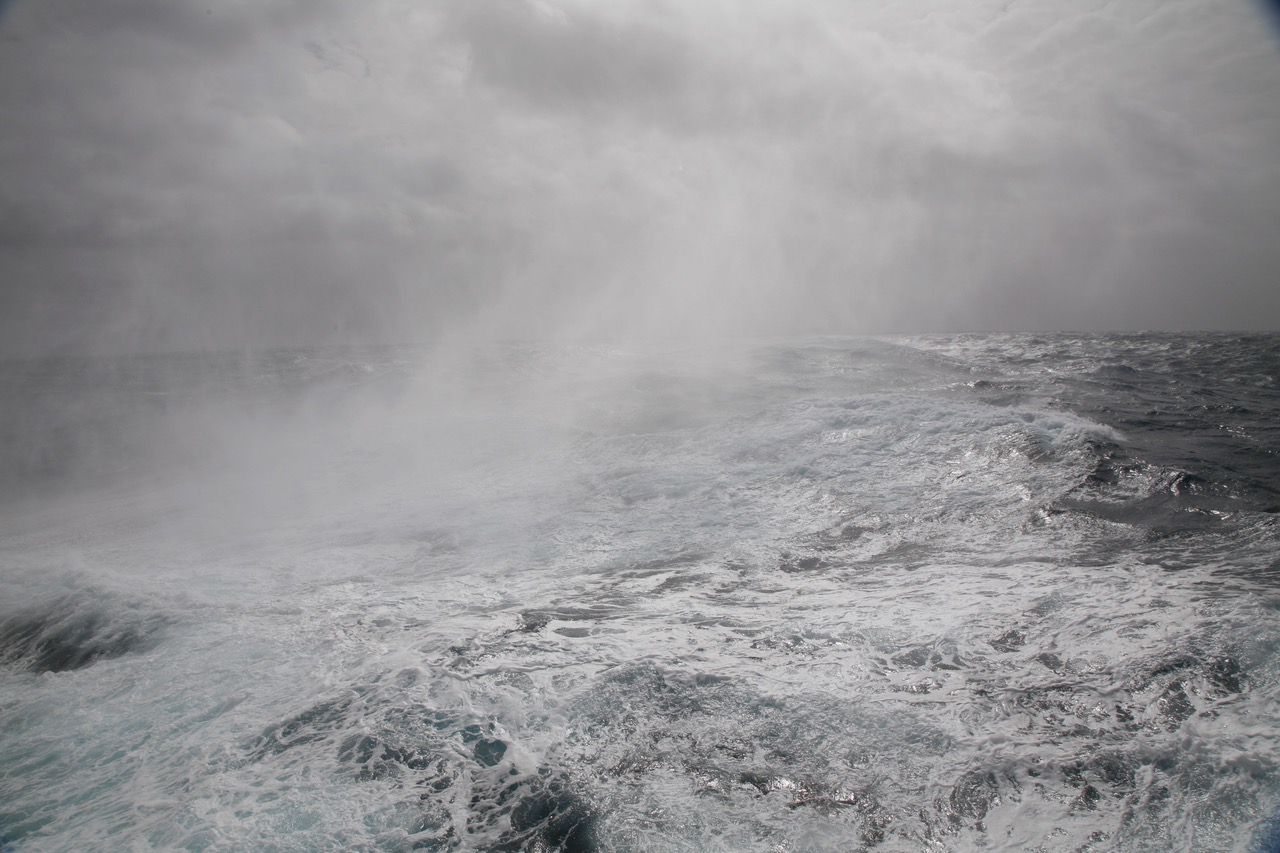Three of us are sitting at the kitchen table at Billy and Isobel Muir’s farmhouse on North Ronaldsay: Robert, the photographer, me, and Billy. Isobel is making lunch. Or she’s trying to make lunch, but Billy keeps getting up and down to look for things, shifting the framed pictures of grandchildren from the mantelpiece, moving the Herd Register For Female Bovine Animals three inches to the left. He’s grumbling under his breath.
After a couple of minutes, Muir comes up with a file, a collection of letters congratulating him on receiving an MBE in 2009. The citation is for “services to North Ronaldsay”, but as I flick through, it becomes clear that none of the correspondents seems able to decide exactly which services they should be congratulating him for. Some letters thank him for his 45 years as a keeper for the Northern Lighthouse Board. Others praise him for preserving the island’s rare breed of seaweed-eating sheep. A couple talk about his work as a retained firefighter and his conservancy of the island’s historic buildings. A handwritten note from a friend says he’s glad Muir has been recognised for the way he dances an eightsome reel.
If Buckingham Palace had really tried to itemise the services Muir provides, the citation would run to several pages. It would be quicker to describe what he doesn’t do: he doesn’t nurse, and he won’t preach. But on the island of North Ronaldsay, he does almost everything else. He’s both firefighter and air-traffic controller, he does the contracting for the wind turbines, sits on the local council, the island trust and the Crofting Commission, collects the rubbish, refuels and fixes everyone’s cars and farm machinery, builds houses, does electrics, plumbing and stonemasonry, manages the lighthouse holiday cottages and takes tours of the light. “Oh, I’m not doing as much as I used to,” he says. “I’ve scaled back tremendously.’
Up in the small communities of the far north of Scotland, most people double up with jobs because it’s the only way to make the local economy work. So the vet might also be a fisherman, the ferry staff could just as well be midwives, and the joiners might double as funeral directors. But even by Orkney’s profligate standards, Muir takes things to extremes. He is a one-man employment boom, a single-handed nation state. Or, just as likely, he’s a 67-year-old Atlas holding up a failing island with a big yellow digger and the sheer strength of belief.
After lunch, Muir puts his plate aside and turns to Isobel. “I’m getting decrepit,” he says. “I hardly could get up the lighthouse today.” This is a barefaced lie. Robert, who’s in his 20s, said Billy scampered up the 176 tower steps at twice the speed he did. So does Isobel want him to start taking it easy? “Of course I want him to cut back. I want him to retire.” Billy mimes shock. “Hell, no!” he says. “Retire? No, no, no! I’m far too young for that.” If he did retire, who would do the work? “I don’t know. The younger generation.”
And that, really, is the heart of the matter. Because there is no younger generation. North Ronaldsay is the last of the Orkneys, the northernmost island before Shetland and Fair Isle. Around 50 people live here full time, plus another 20 or so second-homers. Nearly all the full-timers are well into retirement age, which means that Muir and a handful of others do all the jobs because there’s nobody else – and because he loves this place with the whole of himself.
Muir disappears into the sitting room again and returns with a box full of bright-yellow stationery bearing the JCB logo. “Rubbers, pens. Rulers.” He rakes over them. “You get freebies from the county show to make you buy more.” What, so they give you a pencil and you buy a JCB? Isobel turns. “He did. He bought a digger. He went off on his own to the county show and bought a digger without ever telling me. The phone rings and there’s my friend saying she’d just passed the JCB stand and she’d seen a huge digger with a label with ‘Sold: WT Muir’ on the bucket. That was the first I heard of it.”
Muir puts the box down, smiling, not even slightly sheepish. As far as he’s concerned, that digger has more than earned its keep. “I do everything with the JCB. I pound the sheep, I put up fenceposts, I round the cattle up, I feed them, I take the bales to the field.” He looks at Isobel. “What more do I do? I use it to take me to meetings. Someone said I used it as a bicycle.”
“That’s about it,” says Isobel. “A very expensive bicycle.”
To the non-Orcadian, North Ronaldsay is an acquired taste. From the air, it’s a long skinny slip of land curved round to the right and divided by dry-stone walls into squares and rectangles. Down at ground level, it’s like arriving in a bizarre kind of geological operating theatre, where all the things that make up what most people usually think of as a landscape have been removed. Imagine a patch of land and then take all the flesh off it. Take the hills away, and then the rivers. Take the hedges and the trees, the ploughed or growing fields. What you’re left with is the skeleton of an island, the barest bones of earth.
Without trees, it feels as if there aren’t any seasons. There’s nothing to mark the passage of the year except maybe a row of snowdrops or daffodils, or the grass turning bright or dull. Nobody grows any arable crops here any more, so there’s no ploughing and no harvest. The fields are square, and all the places where green stuff might normally be are full of grey-brown granite instead. The long stone enclosures for gathering and sorting the sheep – the pounds – look like something Andy Goldsworthy made with a hangover. Even the Norse-ish place names sound like a mouthful of pebbles: South Gravity, Ire’s Taing, Viggay.
Still, it’s amazing how much interest you can generate with just three elements. The winds up here can hurl a grown man flat and send whole hen houses with all their occupants whirling out towards the US. Beyond the north-eastern corner, there’s a long flat slab of rock sticking right out into the middle of a shipping lane, which must have wrecked as many ships as Cornwall. The payback for all this ruthless beauty is a place that feels as if it belongs to another dimension. When the wind and the sea are up, there’s so much water in the air that it’s difficult to tell which is which; when you come back from North Ronaldsay, it feels as if you’ve been beaten back to a cleaner, clearer version of yourself.
That clarity affects other things. Everything here is both simpler and more complicated. There is a shop, a couple of bars but no pub, and no garage. Everyone orders their weekly groceries from the supermarkets on the mainland and gets them delivered on the plane. There is a nurse on the island, but a GP comes over for only a few hours a week. Everyone orders their weekly groceries from the supermarkets on the mainland and gets them delivered on the plane. The nurse comes over for a few hours a week. The little six-seater Loganair plane functions as bus, train, post van and delivery van. Without that subsidised service, and without Muir and a handful of others, the island would fail.
The plane ride alone is an exercise in bureaucratic zen. At Kirkwall airport, you walk up to the Loganair office, ask if there’s space on the next flight, and a woman wearing office clothes and a hi-vis jacket tells you yes or no. You and the other four passengers stand around chatting and, 10 minutes later, you all walk out to the tiny plane. The pilot turns and says, “Hello. Everyone ready?”, taxis down the runway, and after half an hour over a sunlit sea, you arrive. Outside a hut, three men in brown firefighters’ uniforms are leaning against the wall, watching. Sometimes it’s raining, sometimes it isn’t. You get out. That’s it. £21 return. No airport security, no iris-recognition, no pat-downs, no x-rays, no safety drill.
But for all the simplicity of being here, it’s modern life that is killing North Ronaldsay. Muir, Robert and I sit in the lighthouse cottages picking over a large tin of shortbread and the Statistical Accounts – the 18th-century equivalent of Google Analytics – a detailed record of every village and parish in Scotland. In 1787, there were 64 houses on North Ronaldsay with an average of six people per household. By the end of the 19th century, there were more than 500 inhabitants. Now there’s barely a tenth of that. What happened?
Some clues lie in Muir’s own life. He was born here in 1948, when “there was no electricity, there was no water in your house, no toilets – it was all very basic, really. If you wanted water, you had to go to the well and carry it home. Eventually, we had a pump – that was quite a step forward: you could have piped water in your house.” Then came generators, bringing light and heat, then television. “You could have your TV and, more significantly, you could have a deep freeze. That was a major breakthrough because everything before that had to be salted or fresh.”
So, even in a place then stuffed with people, self-sufficiency was a prerequisite. “You couldn’t go to Kirkwall every day. You had the ferry once a fortnight when I was a boy, and you had a mail boat three times a week. The ferry might be storm-stayed up to a month, too. We can still get that today.” The island got hydroelectricity in 1983, and almost all the houses were fitted with bathrooms. More recently there have been mobile masts and broadband, though the connection is so bad that working from home is almost impossible. Muir’s daughters did their best to stay on the island, but have now settled with their families on the mainland.
North Ronaldsay primary school has two teachers and one pupil. Teigan Scott is 10, and her specialist subject is hamsters. Her parents came here from the larger island of Lewis five years ago when the council built a couple of homes for young families. One family moved on after a year, but the Scotts have stayed. David does the roads, digs the graves, coordinates the airfield, works for the fire service and acts as handyman at the bird observatory. Maureen was working as a carer, but that came to an end when all her charges died of old age.
Teigan’s two sisters are older; one is at college in Glasgow, and Maxine, 14, commutes weekly from Kirkwall secondary school. Maureen blames the declining population on the lack of affordable housing. By mainland standards, North Ronaldsay seems like real-estate Christmas (last year there was a croft with 13.4 acres, several outbuildings and a Neolithic burial site on the market for £120,000), but it’s still beyond the means of most families. The neighbouring island of Papa Westray (Papay), which used to face exactly the same problems as North Ronaldsay, turned things around by offering cheaper housing and improving communications. Though smaller than North Ronaldsay, they’ve gone from 65 residents in 2001 to 90 today.
What’s it like to live here all year round, when the flights can’t get through and the sea rises so high it’s as if it’s going to pull the whole island adrift? Maureen shrugs, relaxed. “We’ve had only one really bad gale since I’ve been here, when the winds were over 90mph. There have been only a couple of days where I wouldn’t want to go out walking.”
And the bonuses? Maureen appreciates the size of the island and the opportunity for more family time. Plus, she says, “I like not having loads of supermarkets and shopping centres around me, because the kids grow up not thinking that they need to have something. It’s not that my kids don’t have junk, but they don’t get it in a constant stream. Other kids seem to need it like they need air. I wanted them to know the difference between needing it and just wanting it. And also to open their minds up to something different. If they’re living in a place where there aren’t loads of kids, whatever they decide they’re interested in, they don’t have to clear it with their peer group. It shows them it’s OK to be different. You can’t help but be different as the only child at the school – but it means that being different in other areas of their life isn’t such a big leap.”
That evening after dinner, Muir drives Robert and me over to the lighthouse cottages. There are two lights on North Ronaldsay. Dennis Head, the older and lower of the two, was built in 1789 and decommissioned in 1809. In 2006, it was entered into a BBC Restoration appeal for which £300,000 was raised. Two centuries of guano was cleared out, the scaffolding went up… and nothing happened. Now the money has gone and the light stands untouched, encased in quills of scaffolding.
The newer lighthouse, lit in 1854, stands a little further away. It is dark and we find ourselves driving through the middle of a cloud, the air so saturated with moisture that when wisps of cloud slide across the headlights, it looks like wind made visible. Summer fog stops flights more often than winter gales.
As we approach the light, we can see the windows lit up in a row like buttons on a uniform. The beam turns slowly, and we’re caught beneath a great encircling arc of brilliance, silently watching the mist drifting and the lantern’s revolutions. Once in a while, a bird flies into the beam, a sudden fleck of white against the darkness. Somewhere out there is the sea.
Muir describes standing in the lantern room of the lighthouse in the early hours of a spring morning with a mist down over the island. As the sun rose, the mist rose, too, sliding over the windows and trailing away. He watched as a few birds began to break through, heading towards the sun. Then thousands exploded out of the clouds, as if the sky had been holding them down and they had just been released. “I’ve seen some bonnie things in my time,” he says fondly.
Has he ever wanted to live anywhere else? “No, not particularly. I go to Kirkwall and, if I have things to do, I love it. But the minute I’ve done all I want to do, I think, my God, I want to get home again, I’m wasting my time here.” He is silent for a minute or two. Both of us look out at the tower, the light touching us and moving on. “If I had my time again, I would do it all just the same. I wouldn’t change a thing.”
We drive over to the light and climb the 176 steps again, Muir ahead of Robert and me the whole way, to stand beside the majestic Fresnel lens. The glass throws colour against our faces, twisting us upside down or making us vanish like a magic trick. Up here, on a night like this, the question isn’t why you’d want to be here, but why you’d think of being anywhere else.
No matter how well he carries it, Muir can’t hold this place up for ever. Does he really think the island population might get too low to be viable? “It’s a continual danger that, but what the devil do you do? The real challenge is to create work. I’ve been lucky in my lifetime – I’ve had more work than I can do.” But that’s because you keep taking on more tasks, I say. Come to think of it, we never did get to the bottom of exactly how many jobs you do. I think we ran out of… “Time,” he says, and laughs.



